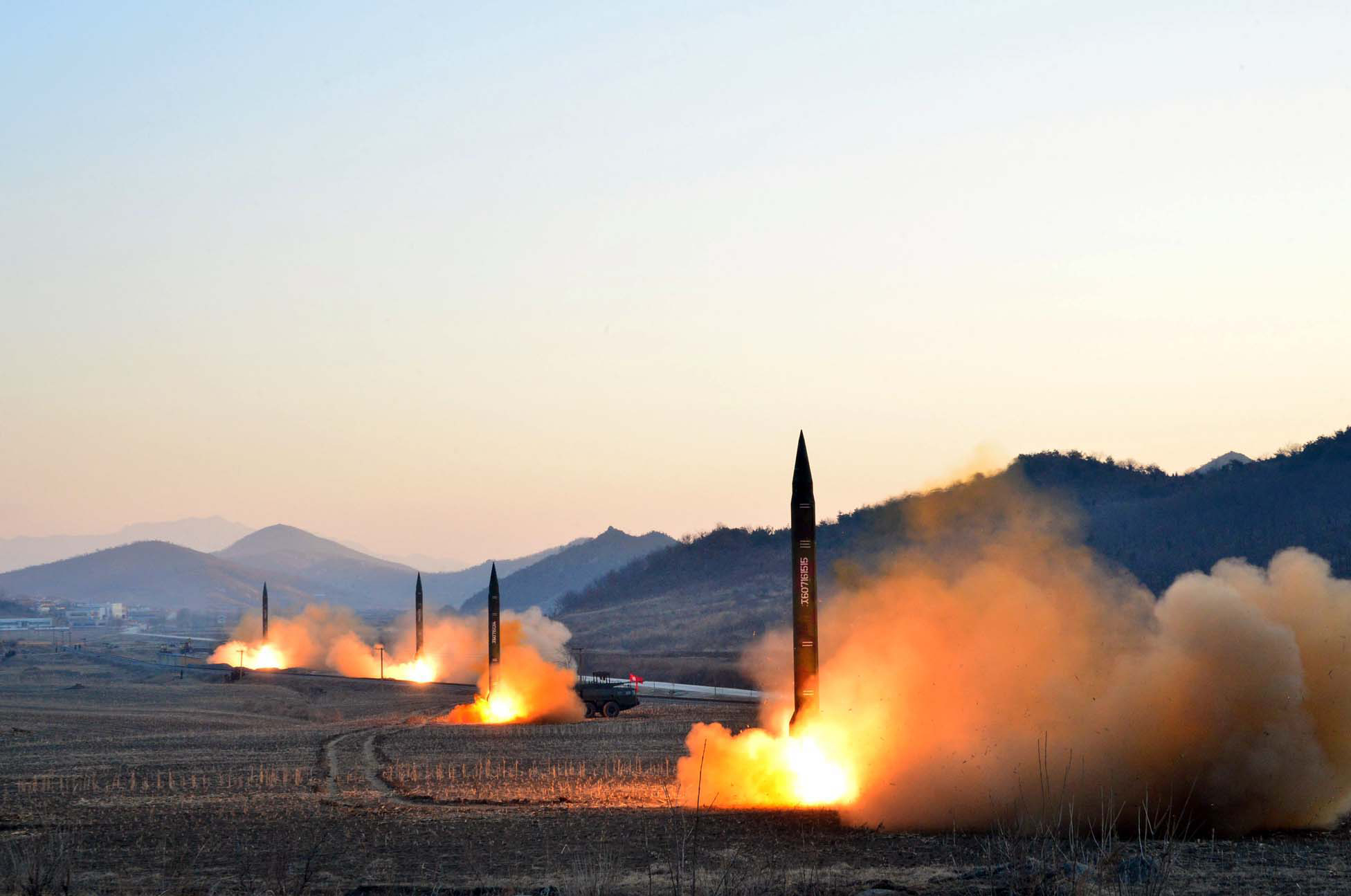How America should handle the frightening North Korea problem
It's time to get tough on the Hermit Kingdom, or risk international disaster


A free daily email with the biggest news stories of the day – and the best features from TheWeek.com
You are now subscribed
Your newsletter sign-up was successful
It's time for the United States to stop separating two clear and present dangers in the Asia-Pacific region and lump them together as one problem that must be confronted immediately.
The evidence is overwhelming that a rising and defiant China, and a rogue North Korea — now armed with what appears to be an intercontinental ballistic missile, or ICBM — must become Washington's top joint foreign policy priority. Everything else — whether it's the Islamic State, Russia, Iran, or even the horrific Syrian civil war — pales in comparison.
But before we start analyzing the dangers America and its allies face today in Asia and what to do about it, we need to know how we got here.
The Week
Escape your echo chamber. Get the facts behind the news, plus analysis from multiple perspectives.

Sign up for The Week's Free Newsletters
From our morning news briefing to a weekly Good News Newsletter, get the best of The Week delivered directly to your inbox.
From our morning news briefing to a weekly Good News Newsletter, get the best of The Week delivered directly to your inbox.
First, the China challenge needs to be understood for what it is: the biggest foreign policy and national security dilemma of our lifetime. While Washington and Beijing enjoy a $600 billion bilateral trade relationship, all the money in the world can't paper over the differences America and China have that are now global in scope. These two superpowers clash in an arc of instability that stretches from Pyongyang in the North all the way to the depths of the South China Sea.
Thanks to the makeup of global power politics, such a clash was almost inevitable.
What brought both of these great powers together — a rising Soviet Union in the late 1960s — is long gone. Chinese scholars, national security experts, and senior leadership have been very clear that when the USSR was no more they then considered America the most likely national security threat — it was just a matter of time before tensions would boil to a head.
And the bubbles have been rising to the surface ever since. From near conflict over Taiwan in the mid-1990s, to an in-air collision in 2001 near Hainan Island, to squabbles over freedom of navigation operations in the South China Sea, and many other challenges in the last several years, it seems a bigger clash is almost inevitable.
A free daily email with the biggest news stories of the day – and the best features from TheWeek.com
But there is a much more fundamental problem that might not be solvable: Both nations have conflicting ideas about what the international order in Asia should look like in the years to come. China believes that a century of humiliation gives it the right to make changes to the Asian order as it sees fit. From building and arming fake islands to placing oil rigs wherever it wants to declaring an Air Defense Identifications Zone to using fishing boats or maritime militia to push their weight around, the message is clear: China is the new hegemonic power of the Asia-Pacific region.
Then there is North Korea, the problem from hell. Kim Jong Un will do anything to ensure his family will always be the rulers of the so-called "Hermit Kingdom." He will lie, cheat, steal, and even kill any member of his own family and acquire any nasty weapons system he needs to guarantee his reign of terror.
How this all connects is even more sinister. China's food and fuel aid keeps the Kim family in power. Chinese officials and experts I have spoken to over the years have told me repeatedly they don't like the status-quo, but fear if they push on Pyongyang too hard, a North Korea collapse would be worse.
This brings us to the present — and a frightening reality for U.S. policy makers and their allies. China wants to turn the Asia-Pacific into its very own sphere of influence combined with a North Korea that is obsessed with survival, going so far as to acquire the most destructive weapons known to man. This sets up the most obvious of international showdowns — a toxic brew that could see any combination of these nations on a path to war that could kill millions.
So what should America and its allies do to confront this double-trouble dilemma?
For starters, Washington needs to make sure Asia continues to be the number one foreign policy priority. No more declaring a "pivot" or "rebalance" to Asia, only to play what amounts to national security hopscotch, merely triaging problems as opposed to solving them. That might make for some tough conversations with our friends in Europe and in the Middle East, but with the dual challenge we face in this vital region, the beating heart of the world's global economy, we must declare to the world that Asia should get the bulk of America's attention.
Next, the Trump administration needs to make it clear that China's support of North Korea will now come at a price, and its ties with Washington will go south. At the very least, China should push North Korea to stop testing missile and nuclear weapons and release the three Americans Pyongyang is holding captive. If China won't even do that, America will have no choice but to consider a rethinking of its relations with Beijing — something China does not want.
Third, America must bring more military might into the region. This means getting serious about rebuilding our armed forces so we don't have to canalize our commitments in other parts of the world. Washington needs to invest in a larger Navy with more attack submarines armed with cruise missiles that would be most effective in an Asian conflict and more missile defenses — especially beefed up missile defenses for the homeland.
Fourth, hold off on any talks with North Korea. If Pyongyang were to release all Americans it is holding and explain the circumstances of student Otto Warmbier's death, maybe there could be some sort of back channel talks towards a formal negotiation in the future. But nations that kill Americans don't deserve the positive optics of sit-down talks with Washington. We can't legitimize this disgusting behavior.
Finally, America must apply crippling sanctions against any entities anywhere in the world that help Pyongyang build its nuclear or missile systems. Washington, being the top dog in the financial system, can essentially put to a halt almost any financial transaction or, at the very least, name and shame those skirting the law or helping North Korea. It's time we put steel behind our actions and make sure Kim knows we mean business.
One thing is clear: If Donald Trump's "America first" strategy is to be a success when it comes to foreign policy, it must also mean Asia first. If not, we will not only have the ultimate of rogue states increasingly armed with more advanced nuclear weapons, but an Asian order that is dominated by an aggressive and coercive China — with other nations simply copying Beijing and Pyongyang's moves. The stakes could not be any higher.
Harry J. Kazianis is director of defense studies at the Center for the National Interest, founded by former U.S. President Richard M. Nixon.
-
 Political cartoons for February 14
Political cartoons for February 14Cartoons Saturday's political cartoons include a Valentine's grift, Hillary on the hook, and more
-
 Tourangelle-style pork with prunes recipe
Tourangelle-style pork with prunes recipeThe Week Recommends This traditional, rustic dish is a French classic
-
 The Epstein files: glimpses of a deeply disturbing world
The Epstein files: glimpses of a deeply disturbing worldIn the Spotlight Trove of released documents paint a picture of depravity and privilege in which men hold the cards, and women are powerless or peripheral
-
 Epstein files topple law CEO, roil UK government
Epstein files topple law CEO, roil UK governmentSpeed Read Peter Mandelson, Britain’s former ambassador to the US, is caught up in the scandal
-
 Iran and US prepare to meet after skirmishes
Iran and US prepare to meet after skirmishesSpeed Read The incident comes amid heightened tensions in the Middle East
-
 Israel retrieves final hostage’s body from Gaza
Israel retrieves final hostage’s body from GazaSpeed Read The 24-year-old police officer was killed during the initial Hamas attack
-
 China’s Xi targets top general in growing purge
China’s Xi targets top general in growing purgeSpeed Read Zhang Youxia is being investigated over ‘grave violations’ of the law
-
 Panama and Canada are negotiating over a crucial copper mine
Panama and Canada are negotiating over a crucial copper mineIn the Spotlight Panama is set to make a final decision on the mine this summer
-
 Why Greenland’s natural resources are nearly impossible to mine
Why Greenland’s natural resources are nearly impossible to mineThe Explainer The country’s natural landscape makes the task extremely difficult
-
 Iran cuts internet as protests escalate
Iran cuts internet as protests escalateSpeed Reada Government buildings across the country have been set on fire
-
 US nabs ‘shadow’ tanker claimed by Russia
US nabs ‘shadow’ tanker claimed by RussiaSpeed Read The ship was one of two vessels seized by the US military
